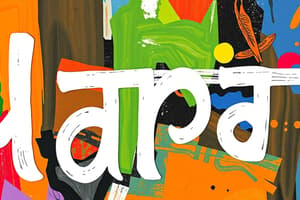Podcast
Questions and Answers
What is the specific region in India where Hindi puppetry is more commonly found?
What is the specific region in India where Hindi puppetry is more commonly found?
- Western India
- Central Northern India (correct)
- Eastern India
- Southern India
What were the traditional open wells known as where people gathered to view Hindi puppetry in the pre-independence era?
What were the traditional open wells known as where people gathered to view Hindi puppetry in the pre-independence era?
- Bawaris (correct)
- Talab
- Kund
- Johad
What type of figures were depicted in the handmade paper puppets used in Hindi puppetry during the pre-independence era?
What type of figures were depicted in the handmade paper puppets used in Hindi puppetry during the pre-independence era?
- Gods, goddesses, princes, princesses, animals, birds, and other characters (correct)
- Only animals
- Modern-day celebrities
- Only historical events characters
What elements were incorporated into full-fledged Hindi puppetry performances after the miniature displays evolved?
What elements were incorporated into full-fledged Hindi puppetry performances after the miniature displays evolved?
What impact did modernization have on traditional arts like Hindi puppetry after independence?
What impact did modernization have on traditional arts like Hindi puppetry after independence?
Which region near Madhya Pradesh is closely associated with Hindi puppetry bazaars?
Which region near Madhya Pradesh is closely associated with Hindi puppetry bazaars?
What was the pivotal factor that led to efforts being made to revive Hindi puppetry during the early twenty-first century?
What was the pivotal factor that led to efforts being made to revive Hindi puppetry during the early twenty-first century?
What aspect of Hindi puppetry remained largely unchanged despite the shift in materials over time?
What aspect of Hindi puppetry remained largely unchanged despite the shift in materials over time?
Which private organization, supported by an NGO, has been instrumental in organizing puppet shows based on folk tales from ancient India?
Which private organization, supported by an NGO, has been instrumental in organizing puppet shows based on folk tales from ancient India?
What activities have organizations like Jagriti and Sankat Mochan Foundation engaged in to promote and preserve Hindi puppetry?
What activities have organizations like Jagriti and Sankat Mochan Foundation engaged in to promote and preserve Hindi puppetry?
In what city is Abhishek Ashram located, which supports private organizations in organizing puppet shows based on folk tales?
In what city is Abhishek Ashram located, which supports private organizations in organizing puppet shows based on folk tales?
What can be inferred as the main reason for the resilience of traditional arts like Hindi puppetry against odds?
What can be inferred as the main reason for the resilience of traditional arts like Hindi puppetry against odds?
Flashcards are hidden until you start studying
Study Notes
History of Hindi Puppetry
Puppetry has been a part of Indian culture for thousands of years, with various forms like Kathputli and Gombeyatha being popular across different regions. However, what we now refer to as Hindi puppetry is more specific to the states where Hindi is spoken, which includes parts of central northern India. These areas come under both Uttar Pradesh and Madhya Pradesh. This form of puppetry is closely associated with the bazaars near the Malwa region of Madhya Pradesh. Given its connection with these regions, it makes sense to trace the origins of this unique tradition back to them.
Pre-Independence Era
The roots of Hindi puppetry can be traced back to the pre-independence era when people used to gather around the traditional open wells known locally as 'Bawaris' located in the heart of every village and city. In these gathering places, handmade paper puppets were displayed using bamboo sticks or strings attached from above. The figures depicted gods, goddesses, princes, princesses, animals, birds, and other characters from mythology, folklore, historical events, and daily life scenes. Over time, these miniature displays evolved into full-fledged performances incorporating narratives, songs, dances, music, comedy skits, and dialogues between puppeteers.
Post-Independence Era
After independence, modernization led to the decline of public interest in traditional arts such as Hindi puppetry. With changing times, materials also changed from handmade cotton cloth and jute bags to synthetic materials. Despite this shift in materials, there was little change in design concepts, which remained largely unaltered over centuries. It was only during the early twenty-first century, particularly after the year 2009, that efforts were made towards reviving this dying artform.
Revival Efforts
Organizations like Jagriti and Sankat Mochan Foundation have played crucial roles in promoting and preserving Hindi puppetry. They organize workshops, training sessions, puppet festivals, exhibitions, seminars, conferences, and documentary screenings to create awareness among youngsters regarding the importance of traditional arts. Additionally, private organizations like Cinekraft, supported by NGOs like Aditya Birla Group's Abhishek Ashram in Indore, have been instrumental in organizing puppet shows based on folk tales and legends from ancient India, thereby keeping alive the vibrant legacy of Hindi puppetry.
Today, Hindi puppetry stands as a testimony to the resilience of traditional arts against odds, thanks to the dedicated efforts of those who continue to safeguard this cultural heritage.
Studying That Suits You
Use AI to generate personalized quizzes and flashcards to suit your learning preferences.




